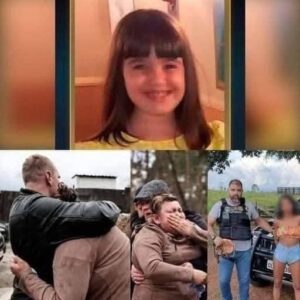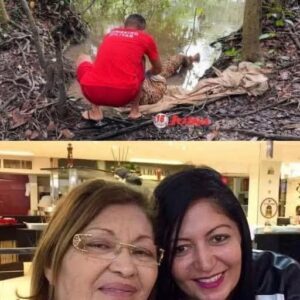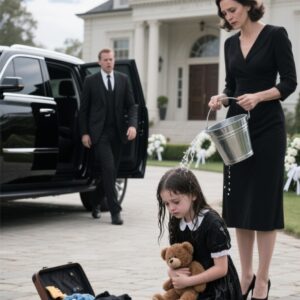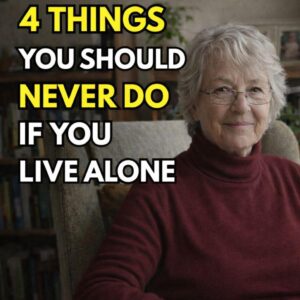In a quiet Romanian village where everyone knew each other by name, a deep silence hung in the air.
Little Alina was gone.
The funeral brought the entire town together, mourning the loss of Stefan Petrescu’s beloved granddaughter. Tears flowed. Heads bowed. Grief wrapped around the gathering like a heavy blanket.
But something didn’t feel right.
Stefan’s old dog, Milo—usually calm and quiet—suddenly began barking uncontrollably. He lunged toward the coffin, pawing and growling like he sensed something no one else did.
At first, Stefan was too lost in his own sorrow to notice. But Milo wouldn’t stop. His barking turned frantic. His body trembled with urgency.
Whispers started among the guests.
“Has the old man gone mad?”
“Poor soul. He’s lost too much.”
But Stefan felt it too—something was wrong.
With shaking hands, he stepped closer to the coffin. Milo pressed up against him, still barking, refusing to back down.
Then… a sound.
Faint. Barely there. But unmistakable.
A moan.
The crowd fell silent.
Stefan froze. Then he grabbed the edge of the coffin lid.
Despite gasps and protests from those around him, he opened it.
And what he saw inside made his blood run cold.
Alina’s eyes—her sweet brown eyes—fluttered open.
Her lips moved. Dry, cracked. Her little chest rose—shallow, but moving.
She was alive.
Everything after that moved fast. People screamed. Some cried. Others fainted.
The priest dropped his prayer book. Stefan didn’t wait. He scooped Alina into his arms, shouted for someone to call the doctor, and bolted toward the village clinic.
Dr. Rosu was already on his way, having attended the funeral himself. He met Stefan halfway down the road and ushered them into his car.
At the clinic, it was chaos—nurses rushing, machines beeping—but by some miracle, Alina pulled through.
She had a rare neurological condition. Something called catalepsy. It mimicked death: no pulse, shallow breath, no responsiveness. The doctors had never seen it before in someone so young. They admitted they’d made a tragic mistake.
But she was back. Alive.
In the days that followed, our tiny village turned upside down. Some called it divine intervention. Others blamed the doctors, the hospital, the funeral staff.
But Stefan didn’t waste time pointing fingers. He stayed by Alina’s side every minute, holding her tiny hand, whispering lullabies, promising her the world.
I was there, too. I’m Stefan’s neighbor. And I’ll tell you the truth: I never saw a man age backward like that.
One moment he was a broken grandfather, slumped by the grave of a child he loved more than life.
The next, he was filled with fire—shaving, smiling, even cooking again. All for her.
But not everything returned to normal.
There were questions.
Why didn’t anyone check more carefully?
How many hours had she been in that coffin?
What if Milo hadn’t barked?
Stefan tried not to think about it. But I know it haunted him—what could’ve happened if just one detail had gone differently.
Still, he found comfort in the ordinary things. Warming up soup. Hanging laundry. Listening to Alina’s laughter echo through his yard again.
One afternoon, a week after it all happened, I asked him what he thought it meant.
He sat back in his creaky chair, looked out at the mountains, and said, “It means we don’t give up. Not even when the whole world says it’s over.”
It’s been three years now.
Alina’s doing fine. She’s in school, learning French, obsessed with horses. She doesn’t remember much from that day, thank God. Just that it was “dark and quiet.”
As for Milo? He’s still alive. Slower now, nearly blind. But Stefan treats him like royalty. “That dog saved my world,” he says. And he’s right.
The village hasn’t forgotten either. Every year, on the day of the almost-funeral, they hold a little celebration. Not flashy. Just candles and a gathering in the square. They call it Ziua Speranței—Hope Day.
Here’s what I learned:
Life doesn’t always end where we think it does. Sometimes, even in our deepest grief, there’s a spark—waiting, silent, almost invisible.
We just have to be willing to listen. To the bark. To the whisper. To the part of us that knows something’s not right.
Stefan listened.
And that changed everything.
If this story moved you, please share it. Someone out there might need the reminder:
Never assume it’s the end. Sometimes, it’s just the pause before a miracle.
Like & share if you believe in second chances.






